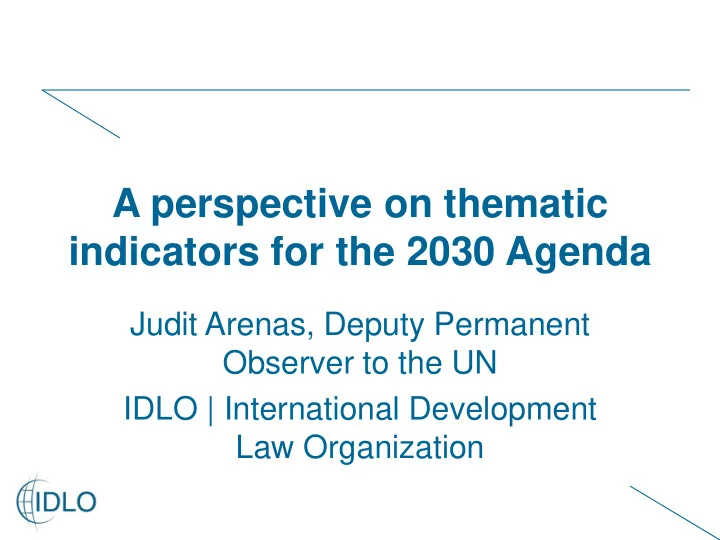

A perspective on thematic indicators for the 2030 Agenda Judit Arenas, Deputy Permanent Observer to the UN IDLO | International Development Law Organization
Thematic indicators Not a new concept – tried out in different contexts Respond to need to aggregate data beyond specific indicators Ties into discussion on burden of reporting and also national/regional indicators
Context - Declaration Goals "are integrated and indivisible and balance the 3 dimensions of sustainable development: economic, social and environmental." "Linkages" and "interdependence" Follow-up and review section emphasizes intent of process “to support accountability to our citizens”
MDGs SDGs 2030 Agenda is new and different: cannot rely exclusively on indicators attached to individual targets. Need to measure progress beyond targets but also goals and OUTCOMES of entire Agenda
New Agenda, building on the outcome of the Rio Conference, reflects a deeper and more comprehensive understanding of what makes the sustainability of development (along with environmental considerations, the imperatives of equity and social inclusion). Calls for "no one to be left behind." Underlies the important work for indicators' disaggregation
HLPF The High Level Political Forum, charged by the General Assembly with the responsibility for the global monitoring of the Agenda will be organized thematically. Inter-relation of the work of the Statistical Commission, including through IAEG and with the support of the UN system, to support the HLPF in making also its thematic reviews as sound and reliable as possible.
Example Goal 16 Agenda points to the need for aggregation of data, across specific targets, to gauge overall impact on different sectors of society and - in the words of Goal 16 -on promoting overall "peaceful and inclusive societies for sustainable development".
2030 Agenda: defines some overriding objectives(eg ending poverty and hunger) and indicates that no single SDG and thus no single target is more important than any other points to many objectives that cut across all areas of responsibilities of the international system and affect the sustainability of the overall development effort.
measuring progress towards fulfilling the 2030 Agenda as a whole: it must be the result of more than merely the sum of its individual parts. “aggregation” across goals and targets- around themes especially relevant in pursuing the main policy messages resulting from the Agenda
Challenges No agreed list of " themes" (yet there are clear common thrusts among the SDGs that are captured in the Declaration) • intergovernmental consultations underway to define the themes around which successive sessions of HLPF will focus • likely to be at higher level of aggregation d Unavoidable overlap
Reality: Member State requests for assistance in developing indicators capable of assessing the responsiveness of laws and policies to the overall commitments they have entered into in the Agenda Individual agency reporting requirements to their own governing body on progress towards the Agenda in its area of mandated responsibly
Proposed steps Inter-relation with HLPF work Development of criteria for shaping themes of global interest Pilot, test, experiment, INNOVATE Map out agency initiatives and contributions of other stakeholders
Preliminary thoughts on criteria Themes: should be faithful to the main characteristics of the Agenda: “transformational” potential and be of “universal” relevance responsive to the Agenda's imperative of policy integration relevance to the Agenda's overarching objectives as outlined in the Agenda's Declaration, including its call to "leave no one behind"
“outcome oriented" and reflect new emphases and new priorities emerging from the Agenda on what makes for the sustainability of development; to the extent possible, draw on the global indicators framework developed by the IAEG and, in turn, contribute to its refinement over time be relevant to global as well to national monitoring requirements.
Composite thematic indicator: "social inclusion" Measure the progress that laws and policies are achieving to effectively engage all sectors of the population in the development effort in ways that contribute to fighting poverty and spreading prosperity and, thus, to the sustainability over time of the overall development process.
Draw from indicators designed to measure progress toward a number of different targets: • SDGs 1,2,3,4,5 8, 10, 16 Bring visibility to sectorial population groups: youth, migrants, indigenous people...
SDG Data pools 1 Poverty line, social protection floors, Indicator data, census, government expenditure, national development plans 2 Food security, malnutrition, govt Indicator data, census, expenditure government expenditure 3 Mortality, health insurance, access to Indicator data, legislation, health census 4 Educational attendance, proficiency, Indicator data, legislation, parity census , expenditure 5 Legal equality, VAW Legislation, judiciary (number of cases), civ soc reports, census 8 GDP, employment, social protection Indicator data, 10 Prosperity, GDP, household Indicator data, judiciary data, expenditure 16 Trafficking, transparency, Indicators, judiciary data, civ soc reports, other indices
Other data sources Potential to draw on other data sources: • Perception surveys • Household surveys • Legislation and legislative analysis • National census • Data from other sectors of government (eg judiciary statistics) • Existing global sources of data (World Justice Index, Peace Index, Gqual tracking)
The International Development Law Organization (IDLO) enables governments and empowers people to reform laws and strengthen institutions to promote peace, justice, sustainable development and economic opportunity. www. w.idl idlo. o.in int Twitter er @IDLO LO
Recommend
More recommend